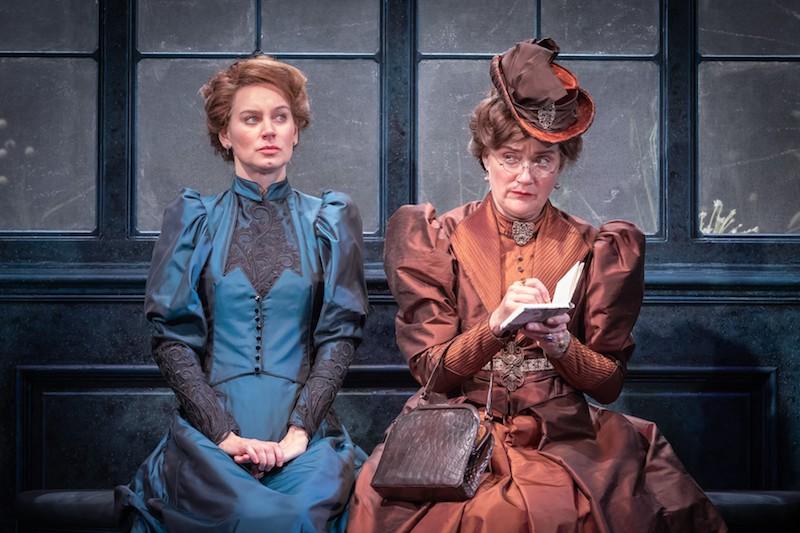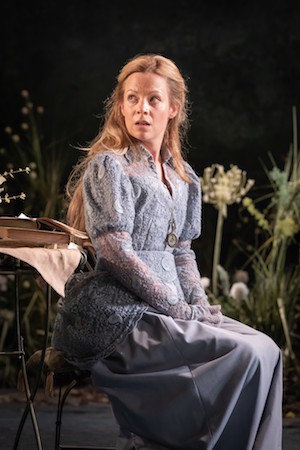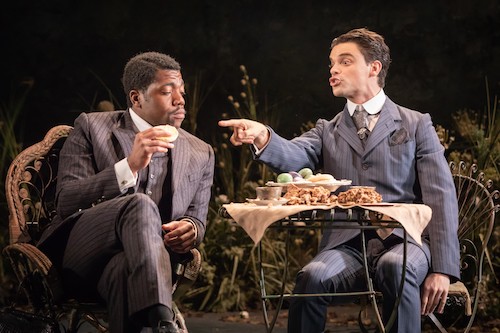The Importance of Being Earnest, Vaudeville Theatre review - Sophie Thompson triumphantly tackles the handbag challenge | reviews, news & interviews
The Importance of Being Earnest, Vaudeville Theatre review - Sophie Thompson triumphantly tackles the handbag challenge
The Importance of Being Earnest, Vaudeville Theatre review - Sophie Thompson triumphantly tackles the handbag challenge
Oscar Wilde's best-loved comedy with extra homo-erotic innuendo

Any actor playing Lady Bracknell must dread the moment when she (or, indeed, he) has to deliver that unforgettable line about a significant piece of hand luggage. Since Edith Evans's wavering, vibrato, multi-syllable version of "a handbag?", audiences have waited to see how it will be dealt with this time.
One might be forgiven for wondering, nevertheless, if yet another production of this prodigiously clever comedy, so full of familiar aphorisms, were necessary. This is the third, in little over a decade, in this West End theatre alone. Any director tackling it would need to be sure that those familiar witticisms crackle as if new and perhaps even discover something that had previously been overlooked.
 Michael Fentiman's sprightly, no-holds-barred direction relishes the topsy-turvyness of Wilde's satirical world, in which lack of moral purpose is desirable, in which smoking is declared to be a worthwhile occupation, and ignorance a delicate exotic fruit. To this he has added a further dimension, an explicit acknowledgement of Oscar Wilde's own turbulent dual identity. Algernon's fictitious elderly friend, Bunbury, forever needing attention in the country, and Jack's imaginary badly behaved younger brother Ernest both allow the young men a means of absenting themselves from tedious social obligations. Wilde too lived a double life, married but indulging his young lover, Lord Alfred Douglas, "Bosie". Algy's drawing-room is decorated with a homoerotic painting and his manservant Lane clearly fulfils a more than fatherly role. Algy's line, "In married life, three is company and two is none", suddenly takes on more than throwaway resonance. In the final scene, when the assembled company looks through the army lists to discover Jack's father's Christian name, Lady Bracknell is handed, by mistake, a copy of The Green Carnation, a scurrilous novel which featured male lovers known to be based on Wilde and Bosie.
Michael Fentiman's sprightly, no-holds-barred direction relishes the topsy-turvyness of Wilde's satirical world, in which lack of moral purpose is desirable, in which smoking is declared to be a worthwhile occupation, and ignorance a delicate exotic fruit. To this he has added a further dimension, an explicit acknowledgement of Oscar Wilde's own turbulent dual identity. Algernon's fictitious elderly friend, Bunbury, forever needing attention in the country, and Jack's imaginary badly behaved younger brother Ernest both allow the young men a means of absenting themselves from tedious social obligations. Wilde too lived a double life, married but indulging his young lover, Lord Alfred Douglas, "Bosie". Algy's drawing-room is decorated with a homoerotic painting and his manservant Lane clearly fulfils a more than fatherly role. Algy's line, "In married life, three is company and two is none", suddenly takes on more than throwaway resonance. In the final scene, when the assembled company looks through the army lists to discover Jack's father's Christian name, Lady Bracknell is handed, by mistake, a copy of The Green Carnation, a scurrilous novel which featured male lovers known to be based on Wilde and Bosie.
But no new twists would matter much if the cast did not deliver the comedy. Here they certainly do, swirling around the stage, matching verbal dexterity with physical energy, albeit with an archness which sometimes borders on cartoonishness. Pippa Nixon's intense Gwendolen slides suggestively down the piano for Jack's benefit. Jacob Fortune-Lloyd and Algy (Fehinti Balogun, making an impressive West End debut: pictured below, left, with Jacob Fortune-Lloyd) make the most of their playful banter and Fiona Button's Cecily (pictured above right) is not so much innocent as untamed. She doesn't merely rip up Gwendolen's diary, she eats some of it. In fact, eating is a theme: there are times when food being stuffed into people's mouths threatens to upstage the wit that comes out of them. But in the middle of it all, Sophie Thompson's delicious Lady Bracknell, booming and swooping, manages to maintain a smidgin of delicacy while being sufficiently formidable to cause panic among the young couples and yet unconventional enough to help herself casually to the sherry at teatime. Madeleine Girling's sets provide a spacious environment for the goings-on, rather than an overdecorated Victorian backdrop. Wilde's feverish brilliance in this play – there is scarcely an unquotable line – makes wicked fun of society's assumptions at just the moment when he was falling foul of them. Within weeks of the triumphant opening in 1895 he had sued Bosie's father, Lord Queensberry, for libel and begun the final, downward trajectory of his life, dying in Paris a few years later, ironically in the very city where the invented Ernest was intended to be "killed off".
Wilde's feverish brilliance in this play – there is scarcely an unquotable line – makes wicked fun of society's assumptions at just the moment when he was falling foul of them. Within weeks of the triumphant opening in 1895 he had sued Bosie's father, Lord Queensberry, for libel and begun the final, downward trajectory of his life, dying in Paris a few years later, ironically in the very city where the invented Ernest was intended to be "killed off".
This is the last play in Dominic Dromgoole's year-long Classic Spring season of Wilde. There have been other highlights – Eve Best in A Woman of No Importance, for instance, and the Foxes, Edward and Freddie, hilarious in An Ideal Husband – but there could be no other culmination than this, Oscar's last, glittering, febrile comedy.
The future of Arts Journalism
You can stop theartsdesk.com closing!
We urgently need financing to survive. Our fundraising drive has thus far raised £49,000 but we need to reach £100,000 or we will be forced to close. Please contribute here: https://gofund.me/c3f6033d
And if you can forward this information to anyone who might assist, we’d be grateful.

Subscribe to theartsdesk.com
Thank you for continuing to read our work on theartsdesk.com. For unlimited access to every article in its entirety, including our archive of more than 15,000 pieces, we're asking for £5 per month or £40 per year. We feel it's a very good deal, and hope you do too.
To take a subscription now simply click here.
And if you're looking for that extra gift for a friend or family member, why not treat them to a theartsdesk.com gift subscription?
more Theatre
 Punch, Apollo Theatre review - powerful play about the strength of redemption
James Graham's play transfixes the audience at every stage
Punch, Apollo Theatre review - powerful play about the strength of redemption
James Graham's play transfixes the audience at every stage
 The Billionaire Inside Your Head, Hampstead Theatre review - a map of a man with OCD
Will Lord's promising debut burdens a fine cast with too much dialogue
The Billionaire Inside Your Head, Hampstead Theatre review - a map of a man with OCD
Will Lord's promising debut burdens a fine cast with too much dialogue
 50 First Dates: The Musical, The Other Palace review - romcom turned musical
Date movie about repeating dates inspires date musical
50 First Dates: The Musical, The Other Palace review - romcom turned musical
Date movie about repeating dates inspires date musical
 Bacchae, National Theatre review - cheeky, uneven version of Euripides' tragedy
Indhu Rubasingham's tenure gets off to a bold, comic start
Bacchae, National Theatre review - cheeky, uneven version of Euripides' tragedy
Indhu Rubasingham's tenure gets off to a bold, comic start
 The Harder They Come, Stratford East review - still packs a punch, half a century on
Natey Jones and Madeline Charlemagne lead a perfectly realised adaptation of the seminal movie
The Harder They Come, Stratford East review - still packs a punch, half a century on
Natey Jones and Madeline Charlemagne lead a perfectly realised adaptation of the seminal movie
 The Weir, Harold Pinter Theatre review - evasive fantasy, bleak truth and possible community
Three outstanding performances in Conor McPherson’s atmospheric five-hander
The Weir, Harold Pinter Theatre review - evasive fantasy, bleak truth and possible community
Three outstanding performances in Conor McPherson’s atmospheric five-hander
 Dracula, Lyric Hammersmith review - hit-and-miss recasting of the familiar story as feminist diatribe
Morgan Lloyd Malcolm's version puts Mina Harkness centre-stage
Dracula, Lyric Hammersmith review - hit-and-miss recasting of the familiar story as feminist diatribe
Morgan Lloyd Malcolm's version puts Mina Harkness centre-stage
 The Code, Southwark Playhouse Elephant review - superbly cast, resonant play about the price of fame in Hollywood
Tracie Bennett is outstanding as a ribald, riotous Tallulah Bankhead
The Code, Southwark Playhouse Elephant review - superbly cast, resonant play about the price of fame in Hollywood
Tracie Bennett is outstanding as a ribald, riotous Tallulah Bankhead
 Reunion, Kiln Theatre review - a stormy night in every sense
Beautifully acted, but desperately grim drama
Reunion, Kiln Theatre review - a stormy night in every sense
Beautifully acted, but desperately grim drama
 The Lady from the Sea, Bridge Theatre review - flashes of brilliance
Simon Stone refashions Ibsen in his own high-octane image
The Lady from the Sea, Bridge Theatre review - flashes of brilliance
Simon Stone refashions Ibsen in his own high-octane image

Add comment